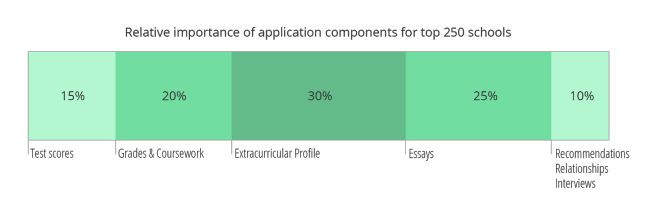What to Bring to a College Interview
What’s Covered
- How Important is the College Interview?
- What to Bring to Your College Interview
- What to Wear to Your College Interview
- Tips for Your College Interview
There are a lot of factors that college admissions officers consider when evaluating applicants. While areas such as grades, test scores, and extracurricular activities hold a lot of weight in an admissions decision, a handful of other aspects are also taken into consideration—like college interviews, for example.
How Important is the College Interview?
In recent years, the college interview has been devalued as colleges’ focus continues to shift toward core considerations like GPA, SAT/ACT scores (if applicable), and a student’s extracurricular profile. While a college interview isn’t likely to make or break an applicant’s odds of admission, it can play an integral role in separating a student from other applicants in their pool. This is particularly true at highly selective institutions.

An interview is an opportunity for an applicant to share a more comprehensive picture of themself than the one painted in their application. At its simplest, an interview gives students a chance to show off their personality and provides a platform beyond essays and extracurricular activities to convey their passions and interests.
A college interview is also an opportunity to explain anything that needs added clarity. For example, an applicant could share how an illness in the family impacted their grades at a particular time, while also highlighting growth or improvement throughout their high school career.
Another benefit of the college interview is that it allows applicants to demonstrate their unique interest in a particular institution. As more and more colleges keep track of demonstrated interest—tracking everything from a student’s campus visits, college collateral signed up for, and classes sat in on—the college interview is another way for an applicant to express their enthusiasm for a college and make their case for why they’re a good fit.
Will My Interview Be In-Person or Virtual?
Many colleges are changing their interview procedures to accommodate both traditional in-person and virtual formats in light of the ongoing pandemic. Because of its adaptability, interviews can be conducted in a way that best suits the needs and preferences of both interviewers and interviewees while also being safe and convenient.
What to Bring to Your College Interview
Traditional In-Person Interviews
Below is a list of what to bring to a traditional in-person college interview, broken down by level of importance.
Must-have items:
- Two copies of your resume
- A notebook and pen to jot down any important information you learn during the interview
- A list of prepared questions to ask
- Directions to the location of the interview
- Anything extra your interviewer specifically requests that you bring
One of the most important items to bring to your college interview is two copies of your resume, one for your interviewer and one for you to use as a reference during the interview. Your resume serves multiple purposes: it provides your interviewer with a snapshot of you as a candidate, can guide interview questions, and helps an interviewer remember you.
Might-need items:
- SAT/ACT scores, if you’re applying with a test score
- High school transcript
- List of AP classes you’ve taken and plan to take
Applicants for specialized programs such as art, performance, and music should come prepared with a portfolio, video, or prepared performance piece, while student-athletes should have a highlight reel handy.
Interviewers usually have limited access to an applicant’s file, so being able to provide them with the bona fides of your college candidacy—such as test scores, GPA, and AP coursework—will help them get a clearer picture of you as a student. Similarly, applicants applying for specific programs will benefit from having material on hand that proves their value in their chosen field.
Just-in-case items (good to have, but not essential):
- A bottle of water
- A snack (nothing messy)
- A hairbrush
- Cosmetics (if you use them)
- A phone (make sure it’s switched to silent)
Virtual Interviews
For virtual interviews, you’ll likely be interviewing from the comfort of your home, though you should still prepare with the same amount of care. Make sure you have the following items nearby during your call:
- Notebook and pen to jot down notes
- List of prepared questions for the interviewer
- Water
- Phone (in case your computer has issues; just be sure to silence your phone)
You also need to make sure your tech is ready to go:
- Charge your laptop to 100% (or even better, plug it in during the meeting).
- Make sure your internet connection is stable.
- If you need a username or email to access the call, make sure it’s professional. The same goes for any profile photos.
- Test a video call with a friend to check whether the sound and video work properly.
Be sure to set up your space as professionally as possible:
- Get good lighting—natural lighting is best, like sitting behind a window (not in front of it, as it will make you look shadowy).
- Find a blank or neutral background, or use a Zoom background.
- Eliminate external noise, and use headphones if you can.
- Let your family know, so they don’t interrupt you on accident. And close the door, so your pets don’t interrupt you on purpose.
What to Wear to Your College Interview
Traditional In-Person Interviews
Business casual is a good guideline to follow when dressing for a college interview. The goal is to look clean, crisp, and well-put-together without coming off as stuffy.
Men should go with dress pants or khaki pants with a belt, a long-sleeved collared shirt, and dress shoes with dark-colored socks. Avoid jeans, sneakers, and flip-flops at all costs. You should also be clean-shaven or have well-groomed facial hair.
The women’s dress code is similar to that of men, only with the additional option of dresses, which should be tailored and fit well. Shoes can range from several semi-formal or formal options, including heels, flats, or boots. In addition to jeans, sneakers, and flip-flops being no-nos, so are leggings. Hair and makeup should be professional-looking, and flashy/distracting jewelry should be avoided.
Virtual Interviews
Dress for virtual interviews is very similar, though you can worry less about shoes. That said, we still recommend wearing a full outfit that’s interview-appropriate. While the interviewer is only likely to see your head and shoulders, you want to avoid the potential embarrassment of standing up and exposing your sweatpants or pajamas (or even worse, your underwear, as the urban legend goes).
Plus, while it may sound silly, dressing head to toe can help get you in the proper interviewing mindset. If you’re “business on the top, casual on the bottom,” you may come across that way in your verbal presentation of yourself as well, even if your interviewer never sees your lower half.
Also, keep in mind that intricate patterns and bright colors don’t always present well on computer screens. You may want to avoid these and select simpler patterned clothes in more neutral colors.
Tips for Your College Interview
With a clear understanding of the importance of a college interview and knowledge of what to bring to it, there are a few other things an applicant can do to wow an interviewer.
Arrive early
Erase any stress about getting to the interview on time and demonstrate characteristics such as punctuality, seriousness, and dependability by arriving early. The same goes for virtual interviews; be ready at your computer at least 15 minutes in advance.
Be polite
Applicants should introduce themselves, shake the interviewer’s hand, smile throughout the interview, and thank the interviewer for their time after your interview. Before leaving, applicants should get the interviewer’s contact information and follow up with a thank-you note.
Make eye contact
Whether your interview is in-person or virtual, be sure to look at the interviewer while you’re speaking. This is especially important for video calls: remember to look at the camera, and not your computer screen.
Avoid cursing and slang
Match the professional dress code of the interview with a professional tone and avoid cursing, harsh language, and slang.
Managing Stress and Nervousness
It would be beneficial to learn techniques to control interview jitters. This can include advice on how to de-stress, mentally prepare, and maintain composure if a student becomes nervous during the interview.
Recognizing Various Interview Formats
Group interviews, behavioral interviews, and case study approaches are just a few of the formats that some colleges may employ. Reading up on these formats and how to ace them could be helpful.
Navigating Technical Difficulties in Virtual Interviews
If technical difficulties arise, remain calm and collected while troubleshooting as best you can. It’s best to anticipate these difficulties before they occur, by making sure you’re using a reliable device, connected to strong, stable Wi-Fi, and are familiar with the software used to interview. However, problems can still occur, and if they do, keeping a calm head and trying commonsense solutions will be crucial. If you’ve exhausted your technical know-how and the problems are persisting, you might try using a backup device, like a phone or device borrowed from a friend or family member, or connecting to different Wi-Fi or a mobile hotspot.
Have confidence
The goal of the interview is to present a confident image of a student who will excel in the classroom and on campus, but beware of overdoing it and coming off as pompous.
Be yourself
This is one of the few opportunities an applicant gets to let their personality shine, so take advantage of it! Answer questions honestly, highlight why you’re a great fit for their school (remember to show with examples and not just tell), and present the best version of yourself by acting mature and poised.
How to Calculate Your Odds of Acceptance
As noted above, the interview is unlikely to be the determining factor for your application. So, as you prep for it, you may be wondering how the other, more crucial aspects of your application stack up at your dream schools. To answer that question, check out CollegeVine’s free chancing engine. It takes into account just about every element of your application (other than your interview, letters of recommendation, and essays, which aren’t quantifiable), including your grades, course rigor, test scores (if you have them), and extracurriculars, to give you personalized odds of acceptance at all of your top choice schools.


